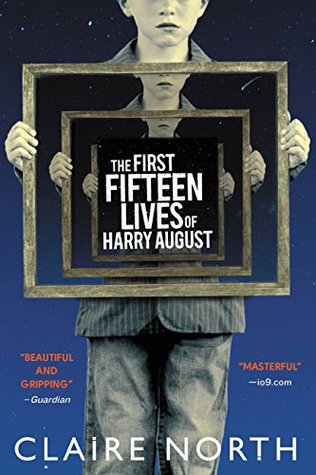Review: Claire North’s “The First Fifteen Lives of Harry August”
by Miles Raymer
Claire North’s The First Fifteen Lives of Harry August is the fantastical tale of a man with a peculiar affliction––or a gift, depending on your point of view. Harry August is born a British citizen in 1919, lives an undistinguished life as a groundskeeper, and dies seventy years later. But instead of entering an afterlife or the inky blackness of nonexistence, he finds himself reborn in exactly the same time and place as his original birth, only with all of the memories from his previous life intact. Having no idea what might have caused this bizarre state of affairs, Harry descends into a “rather clichéd madness”:
As the full powers of my adult consciousness returned to my child’s body, I fell first into a confusion, then an agony, then a doubt, then a despair, then a screaming, then a shrieking, and finally, aged seven years old, I was committed to St Margot’s Asylum for Unfortunates, where I frankly believed myself to belong, and within six months of my confinement succeeded in throwing myself out of a window on the third floor. (8)
As one might guess from the title, Harry’s second life is followed by a third, again with the exact same origins but all the memories from his previous two lives. He appears to be caught in an endless time loop, and it’s not until his fourth and fifth lives that he meets others––called kalachakra––who also experience the same infinite cycle of birth and rebirth. He learns that this tiny global minority has existed for millennia, and most of its members belong to a secret society called the Cronus Club. Centuries of wisdom has taught the Club not to abuse its unique situation by trying to alter the course of history––a rule they enforce with usually-gentle but occasionally-brutal tactics.
This is a truly terrific starting point, one for which North gets full marks. As Harry’s story unfolds, she develops his world with clever ideas about how kalachakra send messages backwards and forwards in time, how they can erase memories of their previous lives for a fresh start, and even how they can die permanently. Thematically, the novel offers intelligent musings on the complex nature of causality, the history of mental illness, the nuances of interpersonal intimacy, and humanity’s accelerating technological development. It is also a great example of a nemesis/revenge narrative in which the protagonist must resolve to defeat his closest friend.
Despite these many positive qualities, Harry August never quite clicked for me. North’s writing is lively but compromised by distracting phrasing and punctuation choices. The book is repetitive, plot-heavy, and sometimes difficult to track as Harry’s first-person recounting flits in and out of his various lives. There’s an artful quality to this narrative structure, but it also feels desultory at times. The chapters tend to be short and move along at a nice pace, which made it surprising when boredom crept up on me while reading. And even though the relationships between characters are generally engaging and well-developed, I never invested in them as much as I wanted to.
While I believe that most of my discontent with Harry August was due to my personal preferences, there is one aspect of the novel that I think is objectively bad. This is the fictional invention––called a “quantum mirror”––that North uses to raise the stakes as Harry and his nemesis square off. She falls into the common trap of utilizing “quantum” as a hand-wavy term for “the answer to everything” with no firm scientific grounding. I think the book would benefit from the removal of this idea and its accompanying “end of the world” implications. These components felt cheap and trendy compared to North’s intriguing musings on the cyclical minutiae of Harry’s experience. Had the central conflict avoided aspirations of universal import, something even more distinctive and surprising could have emerged from this excellent premise.
Rating: 6/10
